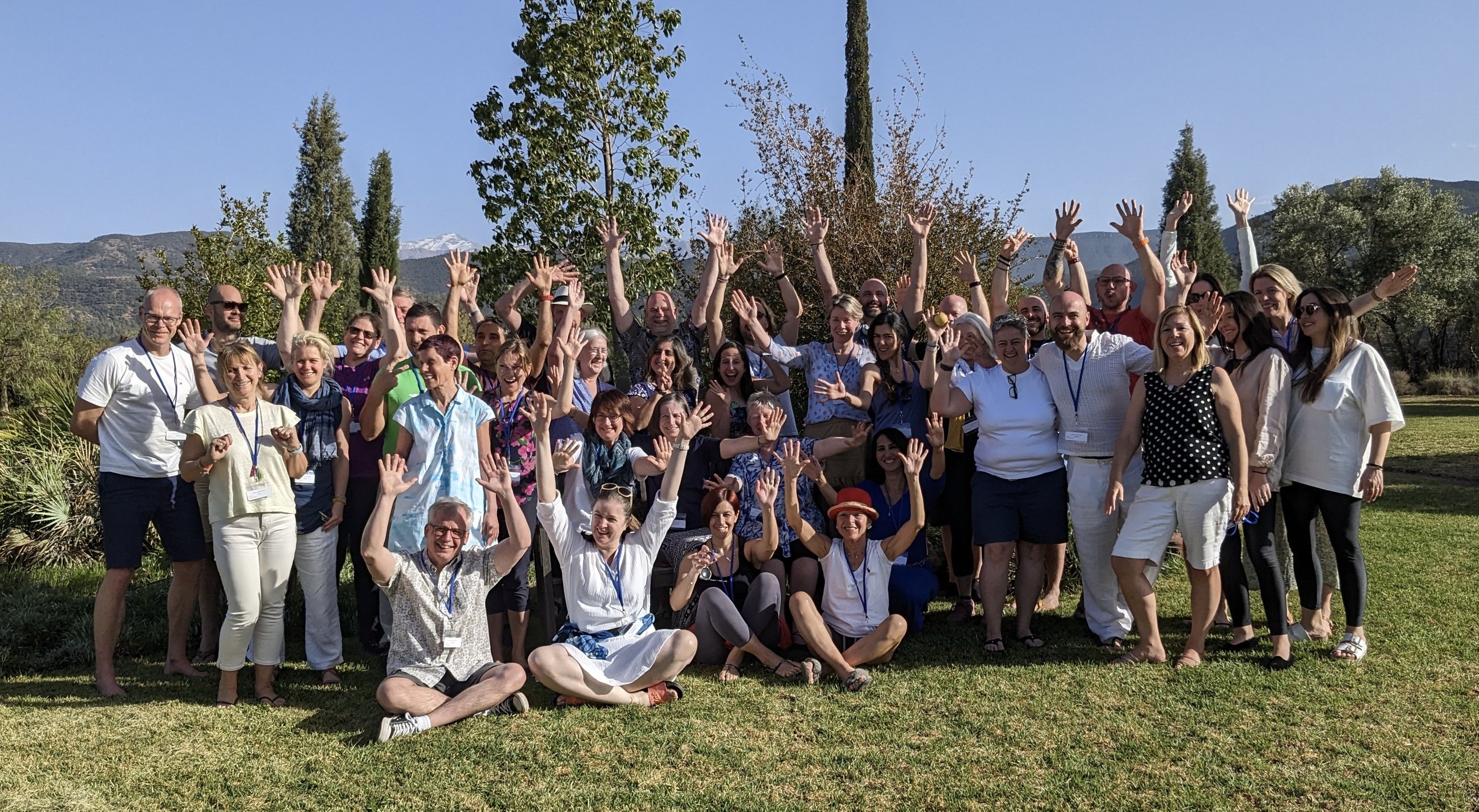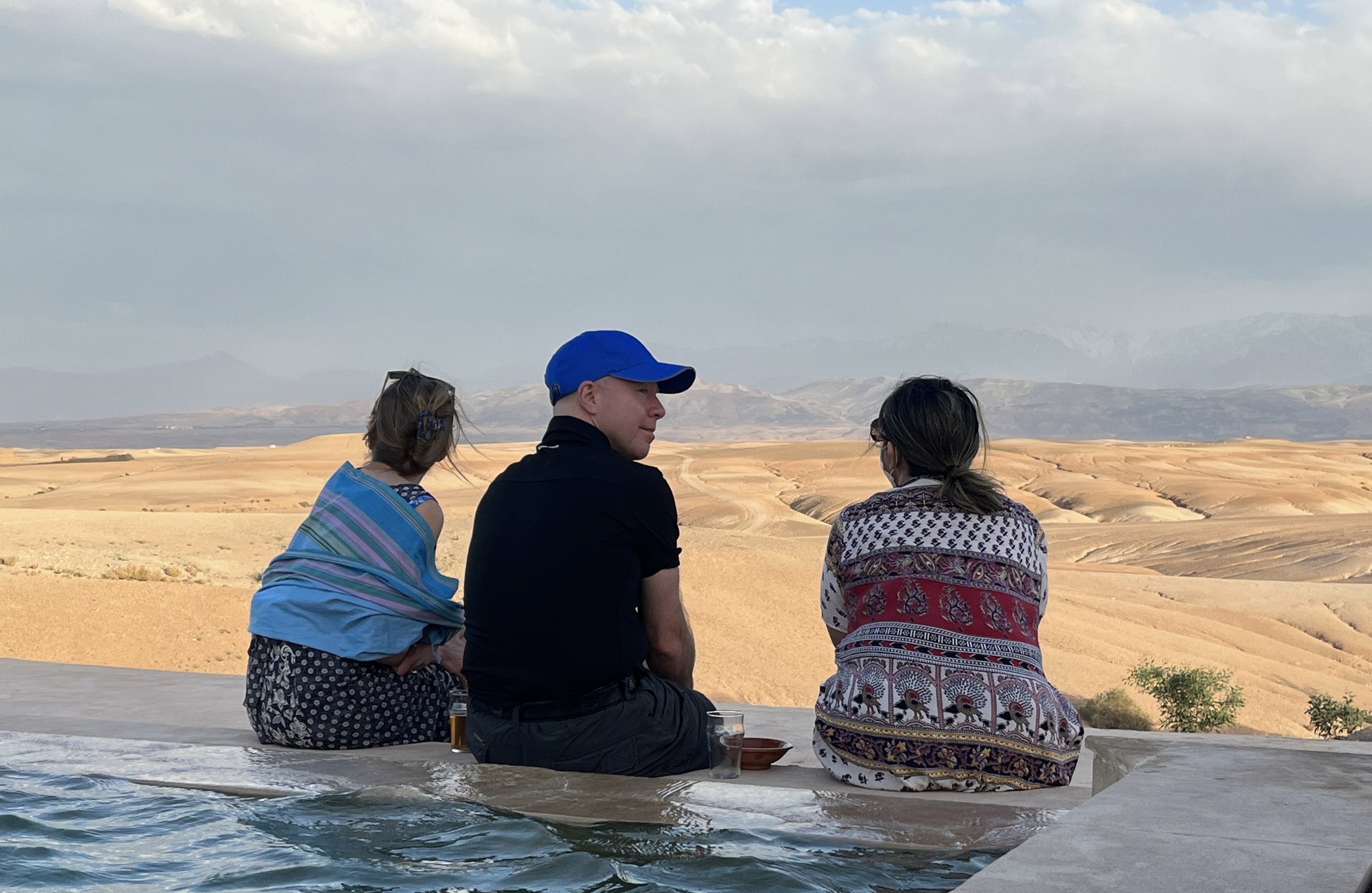Taking a Quality-Time Love Bath
Or continue reading the blog below.
Forty members of the Wise Humanity Community gathered last month for a four-day retreat in the foothills of the Atlas Mountains, Morocco. The time together was so deeply nourishing that it started me thinking anew about the isolation that we suffered during the pandemic, and how we are learning and recovering from it—and how I personally have been learning and recovering from it.
Before the pandemic, I thought I was impervious to loneliness and isolation. Always a bit of an introvert, happy as a clam to stay home with a book, I kept myself intact during the lockdown of 2020 with yoga, meditation, and remote work. I wasn’t worried about my mental health. But with the passage of time, I noticed the toll that the isolation had taken on me.
As my city gradually reopened, I found my life didn’t automatically go back to “normal.” My work didn’t return to in-person; it stayed remote. Relationships that had been interrupted didn’t automatically restart. Habits of isolation had come to feel familiar and convenient.
My mind was telling me that being alone at home was easy and relaxing, but my nervous system started signaling otherwise. I became more prone to anxiety and quicker to tears. Something was wrong with me; I felt dysregulated. And my recent reading in neuroscience helped me understand why.
The new field of relational neurobiology shows that our social relationships are not merely a nice-to-have comfort. They are necessary to our nervous systems.
As neuroscientist Lisa Feldman Barrett explains, our brain’s most important function is regulating our body functions such as metabolism and hormones, and this regulation depends on relationships:
Family, friends, neighbors and even strangers contribute to your brain’s structure and function and help your brain keep your body humming along. This co-regulation has measurable effects.
We adjust each other's body budget [nervous system, metabolism and hormones] by our actions. If you raise your voice, or even your eyebrow, you can affect what goes on inside other people's bodies, such as their heart rate or the chemicals carried in their bloodstream. If your loved one is in pain, you can lessen her suffering merely by holding her hand…
Changes in one person's body often prompt changes in another person's body… We often mirror each other's movements in a dance that neither of us is aware of.
Barrett’s explanation resonated with my experience. I could feel my body’s reactivity to a raised eyebrow or hug. The image of the invisible dance that co-regulates our breathing and metabolism also rang true. Women who spend time together invisibly synchronize their menstrual cycles and that people even mirror each other’s breathing and heartbeat. The invisibility of these connections brings to mind the recent revelations about the hidden life of trees—how trees live in society, communicating and sharing resources underground to help each other survive. Trees are not the separate individuals we thought they were, and neither are we. Our emotional connectedness is as real as a network of underground roots. And even if we are fed and housed, being cut off from the network of emotional connection can be deadly.
Even before the pandemic, humans around the world were suffering a loneliness epidemic. According to a Cigna study, fully 54% of Americans said they always or sometimes felt that no one knew them well, and many days went by when they didn’t have a substantial conversation with anyone. Nearly half of Britons over 65 considered the television or a pet their main source of company. In Japan, there were more than half a million people under 40 who hadn’t left their house or interacted with anyone for at least six months. Loneliness can hit hard at all ages: it is even on the rise among children and new parents.
Feeling lonely on a regular basis is as detrimental to our health as smoking fifteen cigarettes daily, and twice as dangerous as being obese. Loneliness significantly increases our risk for heart disease, stroke, dementia and earlier death. These findings confirm the ones in the famous Harvard study, the longest longitudinal study of wellbeing ever conducted. Strong social relationships predicted wellbeing and longevity better than wealth, fame, genes, or IQ.
Relational neurobiologists argue that our relationships help create our minds, and our minds help to create our brains. You read that right: even though we usually think that our brains create our minds, it also works in reverse. Our relationships and minds create pathways and functions in our brains in a lifelong process of neuroplasticity. Crucially, this process starts in infancy, when a caregiver must provide not only food and shelter, but also the caregiver’s real attention and emotional comfort. The infant has to perceive that their needs are being understood and responded to in relationship. Otherwise, provided with mere physical sustenance, the child can fail to thrive and even die.
As the traditional African concept of Ubuntu teaches, “a person is a person through other persons.” We cannot come into being or survive, our brains cannot develop, except through human relationships.
So no wonder my body felt dysregulated after the pandemic isolation. And no wonder that the feeling of nourishment at the recent Wise Humanity retreat was so palpable.
Together at our retreat, we sat and talked, ate, hiked, swam, did yoga, qigong and breathwork, and danced. We shared life stories and we talked over particular experiences and pain points in small groups.
Friends who hadn’t seen each other for years were finally able to offer hugs and condolences in person for the losses of the pandemic.
It felt like we were washing the isolation’s effects off in a bath of trust, empathy and connection. A love bath.
So even though I’m still living alone and working remotely, I’ve decided to make the in-person “love bath” a non-negotiable part of each week. A meal, a walk-and-talk in the neighborhood, or a book club meeting can be my love bath. I understand now that even for an introvert, regular quality time with friends and family is a must.




